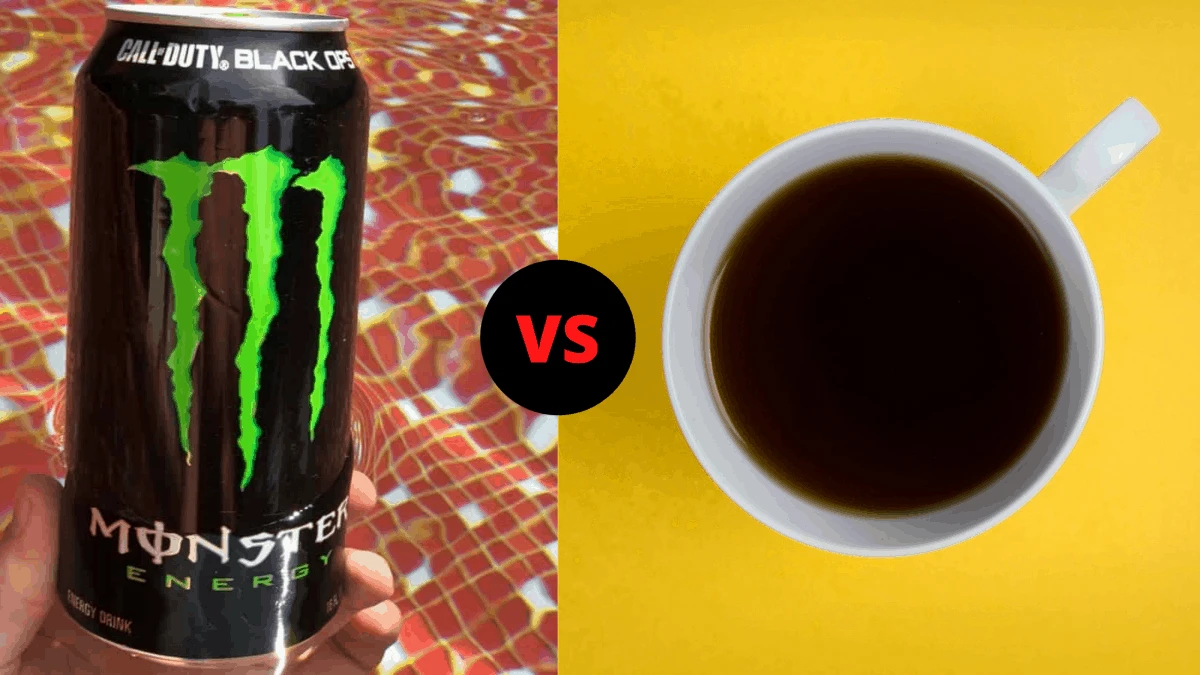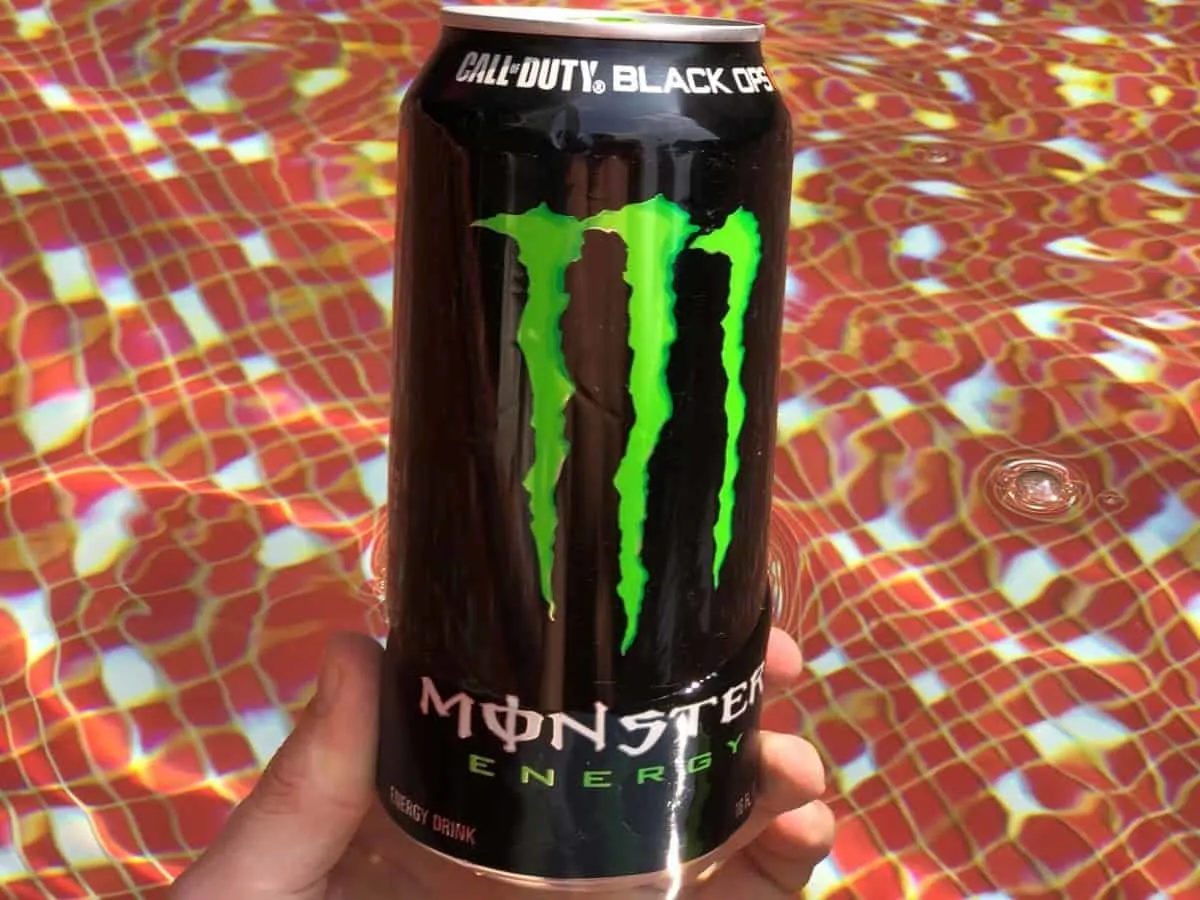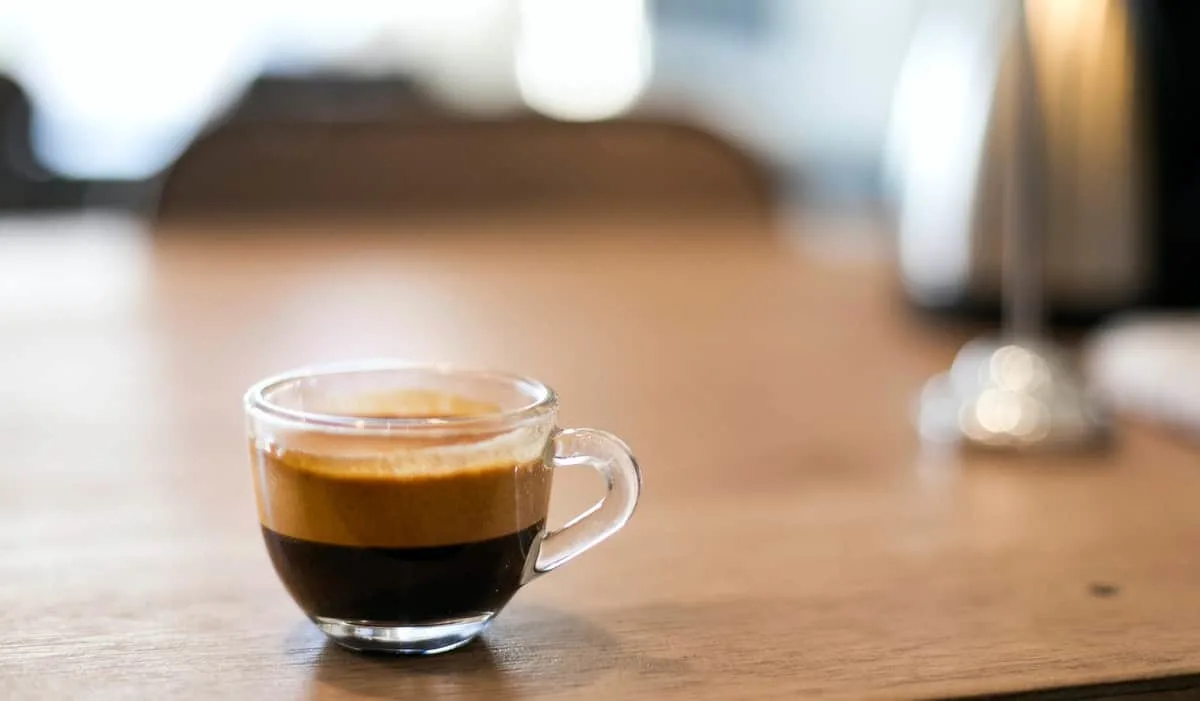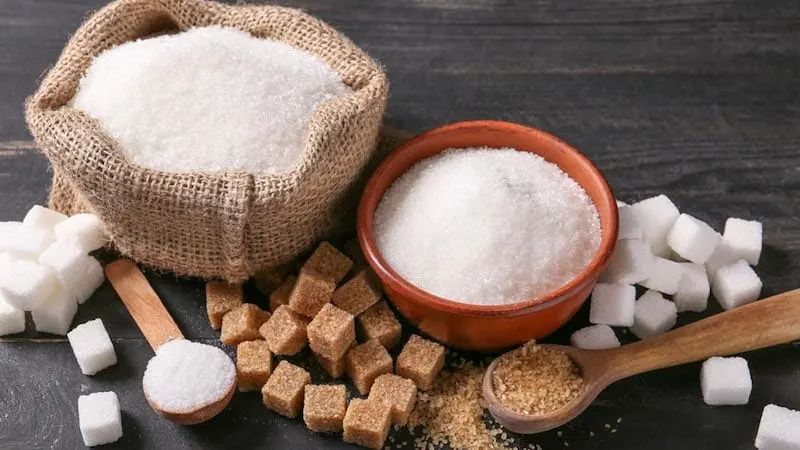While coffee and energy drinks are as different as day and night, they do share one common similarity: caffeine. Though both are good at keeping you awake and focused, how do they differ in nutritional content, duration of efficacy, and how much they affect our bodies?
Some people may pick a cup of Joe, while others may choose an energy drink such as Monster to boost their energy. But which is preferable? Coffee or Monster Energy?

In my opinion, regular coffee has all the benefits that an energy drink like Monster simply doesn’t. While Monster comes in a standard formulation, you can easily modify a cup of coffee to suit your health needs and use less sugar or opt for alternative sweeteners.
But if you want to know more about why I think so and what the pros and cons of each beverage are, then continue reading.
Contents
Caffeine in Monster and Coffee
Caffeine, as we all know, is the main component of coffee and energy drinks. It is what is known as an adenosine antagonist, which is responsible for stimulating our neurological system, helping keep us awake and alert.
Caffeine provides numerous benefits such as increasing attention, reducing fatigue, improving mental and physical performance, and many others.
While the caffeine in coffee and energy drinks may come from different sources, all versions of caffeine fundamentally act the same, whether it’s from natural plant extracts or concentrated powders like caffeine anhydrous.
Other brands may use guarana, guayusa, green tea, or yerba mate, but these are often hard to procure or simply more expensive than coffee beans.
But where they may be similar in terms of caffeine source, they may differ greatly when it comes to caffeine level.

A can of Monster (16 fl.oz) contains at least 160mg of caffeine, which is a reasonable quantity given that the FDA recommends you drink no more than 400mg a day.
Though it may still rely on your caffeine tolerance levels, if 160mg of caffeine is too much for you, 50-100g of caffeine may enough to provide the needed burst of energy.
This is why a cup of coffee may be more suited for those who have a higher caffeine sensitivity because you can always reduce the amount of coffee you use during the brewing process.
The caffeine content of a cup of coffee varies based on the beans used, the measurement, and the type of coffee drink. Caffeine levels in a cup (8 fl. oz.) of plain brewed coffee can range from 75-140mg (95mg on average).
Caffeine Levels on Other Types of Coffee

As I’ve mentioned before, the caffeine level of your coffee varies depending on the beans used and how they are brewed. Here’s a short breakdown of the caffeine level of various coffees:
- Espresso – 63mg of caffeine (1.75 fl. oz)
- Instant coffee – 30-90mg of caffeine (8 fl. oz)
- Decaf coffee – 3mg of caffeine (1-7 fl. oz)
- Cold brew – 153mg of caffeine (12 fl. oz)
What’s The Right Amount of Caffeine?
Caffeine intake should not exceed 400mg per day, according to the FDA. Many energy drinks contain up to 350g of caffeine per can, which is close to the prescribed maximum.
Though 400mg of caffeine does not do immediate harm to your health, since you will need to consume at lead 10g of caffeine for you to experience an overdose, people have still died from consuming far less than the lethal dosage, although these cases were often associated with energy drinks than regular coffee.
Coffee may improve alertness, reaction time, and workout efficiency, but if you can’t tolerate caffeine all that well, or go over the recommended daily limit, there might be some notable side effects such as:
- Insomnia
- Palpitations
- Anxiousness
- Nausea
- Hallucinations
- Headache, and;
- Dysphoria
And more serious health risks like:
- Convulsions
- Irregular heartbeat
- Hypertension
- Osteoporosis
- Twitching of muscles
- Death
To know more about caffeine, here’s a video by Doctor. Mike on YouTube:
Which Is Better, Monster or Coffee?
To begin, we must recognize that both coffee and energy drinks such as Monster may both be useful to us on occasion. Coffee, in its most basic form, may offer us a burst of energy. Still, Monster can supply us with energy and contains an arsenal of substances that can be ideal for cognitive and physical functioning.
Let’s take a look at some of them.
Nutritional Facts and Ingredients of Monster
Here are the nutrition facts of a 16 fl. oz can of Monster Energy in the table below:
| Typical Values | Monster Energy (16 fl. oz) |
| Energy | 210 calories |
| Fat (Of which Saturated) | 0g (0g) |
| Carbohydrates (Of which Sugars) | 54g (54g) |
| Caffeine | 160mg |
| Protein | 0g |
| Sodium | 370mg |
| Vitamin B2 (Riboflavin) | 3.6mg |
| Vitamin B3 (Niacin) | 46mg |
| Vitamin B6 | 4.6mg |
| Vitamin B12 | 13µg |
And here’s a list of Monster Energy’s Ingredients:
- Carbonated Water
- Sugar
- Glucose
- Citric Acid
- Natural Flavours
- Taurine
- Sodium Citrate
- Color Added
- Panax Ginseng Extract
- L-Carnitine L-Tartrate
- Caffeine
- Sorbic Acid
- Benzoic Acid
- Niacinamide (Vitamin B3)
- Sucralose
- Salt
- D-Glucuronolactone
- Inositol
- Guarana Extract
- Pyridoxine Hydrochloride (Vitamin B6)
- Riboflavin (Vitamin B2)
- Maltodextrin
- Cyanocobalamin (Vitamin B12)
In addition to this, a 16 fl. oz can of Monster Energy contains 54g of sugar, which is an atrocious amount in my opinion as it easily exceeds the daily limit for both full-grown adults, which is 24g for women and 36g for men.

Sugar is another carbohydrate that converts to energy; it is no surprise that it’s a popular ingredient in energy drinks. They boost your mood and revitalize your system throughout the day when combined with coffee.
But too much sugar can also pose side effects such as:
- Acne
- Tooth decay
- Weight gain
- Risk of diabetes
- High blood pressure
Taken together, Monster Energy is a highly processed beverage that will undoubtedly provide you with the energy you desire, but only momentarily. Energy drinks, in general, and may trigger a sugar crash or caffeine withdrawals, especially if you have a poor tolerance for these major ingredients.
How Much Monster Energy Can You Drink In A Day?
Personally, I advise you to not drink more than one can of Monster energy a day. Otherwise, opt for a freshly brewed cup of coffee instead to give your body a break from processing all those supplements and vitamins that you honestly don’t need.
Monster has a monstrous amount of sugar, pardon the pun. Therefore, this should be enough reason for you to avoid drinking it altogether, especially when there are sugar-free alternatives in the market.
However, Monster does have a sugar-free version that uses sugar substitute as its sweetener so that option is always open to you if you’ve somehow developed a liking to the taste and flavor of this particular brand.
If you want to maintain a high level of energy for an extended period of time, consider the following methods or beverages:
- Getting active
- Decent amount of sleep
- Avoiding alcohol
- Maintaining proper and healthy diet
- De-stress
Alternatives of Monster Energy:
- Coffee
- Green tea
- Yerba mate
- Ginger tea
How many cups of coffee are equal to a monster?
As a rough estimate, a 16-ounce can of Monster Energy typically contains around 160 milligrams of caffeine, while an 8-ounce cup of coffee usually contains between 70 and 140 milligrams of caffeine, depending on the type of coffee and the brewing method.
So, in terms of caffeine content, a 16-ounce can of Monster Energy is roughly equivalent to one to two cups of coffee. However, it’s important to keep in mind that energy drinks may contain additional ingredients, such as sugar or other stimulants, that can have other effects on the body beyond just the caffeine. It’s always a good idea to consume energy drinks in moderation and be aware of the potential health risks associated with excessive caffeine consumption.
Are 2 cans of Monster too much?
Consuming two cans of Monster Energy drink per day may be too much for some people, as the caffeine content in a single 16-ounce can of Monster Energy is already quite high, typically around 160 milligrams.
Consuming too much caffeine can cause a range of negative side effects, including increased heart rate, high blood pressure, anxiety, and difficulty sleeping.
Overall, it’s important to consume Monster Energy drinks in moderation and be aware of the potential health risks associated with excessive consumption. If you have concerns about your caffeine or sugar intake, it’s always a good idea to talk to a healthcare professional for personalized advice.
How long does it take for Monster to kick in?
The time it takes for Monster Energy drink to kick in can vary depending on a variety of factors, including the individual’s metabolism, body weight, and caffeine tolerance, as well as the amount and timing of the consumption. Generally, caffeine is absorbed fairly quickly by the body, with effects beginning to be felt within 15-45 minutes of consumption.
The caffeine in a 16-ounce can of Monster Energy drink is approximately 160 milligrams, which is a relatively high dose for many people. This can lead to a fairly rapid onset of effects, including increased alertness and energy, and may last for several hours.
Is Monster Bad For You?
I feel Monster energy works really well, ‘to offer energy,’ as long as nothing more is expected of it, and you are well aware that consuming all of the caffeine and sugar contained daily isn’t good for your health.
While Monster can offer a short boost, you should be more concerned about your body and well-being in the long run especially where sugar is concerned, and you should absolutely avoid getting excessively dependent on energy drinks in general no matter how healthy they are.
Monster, in my opinion, could be used if it is essential, or if you don’t have time to go to a Starbucks or brew a fresh cup of coffee at home. For example, during exercises, extended study sessions, or all-nighters.
So, as long as you use your Monster sparingly and only when necessary, it won’t be too awful for you. However, as I’ve mentioned before, please opt for the sugar-free version because 54g of sugar for a single serving is simply preposterous.
For a more brief review of Monster Energy, here’s a review by KBDProductionsTV on Monster:
Is Coffee Healthier Than Monster Energy?
Even though Monster is high in vitamins and minerals, it does not negate the fact that coffee is natural and preferable to energy drinks like Monster.
Furthermore, even one 16-ounce energy drink can raise blood stress hormones, putting a healthy young adult at risk for cardiotoxicity.
Coffee does not Contain Calories
In comparison to coffee, Monster includes a lot of sugar and has 110 calories per can. It is also heavily processed and may cause a sugar crash. Coffee, on the other hand, may provide you with energy without adding extra calories.
However, this is only true if you drink it black, with no cream or sugar, although low-calorie plant-based creamers and artificial sweeteners like stevia and monk fruit extract can always be used if you don’t particularly like plain black coffee.
Coffee is Cheaper
A can of regular Monster costs $2.77 and $32.99 for 24 cans, which is rather expensive for a brief boost. At the same time, a 200mg instant coffee can only be purchased for $22 and can produce up to 34 cups of coffee.
Coffee has Natural Ingredients
Assuming you brew it yourself or know exactly what goes into your order should you decide to buy it from a coffee shop. Canned and 3-in-1 coffees still contain stabilizers and preservatives.
However, even if you do opt for commercially packaged coffees, you’re still better off than drinking energy drinks like Monster.
Most of the components in Monster, such as taurine, L-carnitine, and tyrosine, are things you won’t need in the first place. While these ingredients have been known to boost mental performance, caffeine itself is a powerful nootropic, which pretty much renders these other ingredients redundant.
Caffeine stimulates your cognitive function enough to keep you aware and awake while also providing you with the necessary boost. Controlling what you put in your body is part of being healthy, and you know what’s in it that you’re drinking.
Conclusion
Taken all this into account, I can pretty much say that coffee wins over Monster.
Not only because it is natural but is devoid of any chemical substances that you won’t even need in the first place as long as you’re getting your boost of energy.
Though I’m not entirely saying that Monster Energy is bad for you. Monster Energy sure does work wonders if you need a more elevated mood or want to revitalize your system to the next level. But please opt for the sugar-free version because the original has 54g of sugar, which is a red flag.
Monster works particularly well in sports, fitness, and for those who require laser-focused concentration or wish to pull all-nighters, which is why it is extensively promoted at sporting events and convenience stores near workplaces and colleges.
But in the end, it just all comes down to this: as long as you keep watch and monitor your caffeine consumption, these two beverages are a great pick-me-up that will surely alleviate your tiredness and keep you going when all you want to do is curl up in bed and drift off to dreamland.
